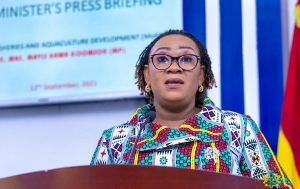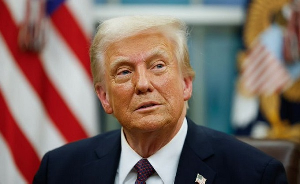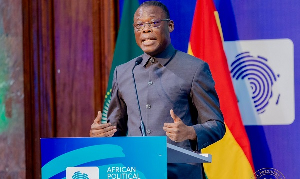Amilcar Cabral: “ONE OF THE GREATEST MEN [NKRUMAH] MANKIND HAS SEEN THIS CENTURY.”
About the British, George Orwell noted in his “Reflection on Gandhi”: “Hypocrisy is the British vice.” In this essay Orwell took exception to a statement E.M. Forster made in his novel, “A Passage to India.” Forster stated that “maniacal suspiciousness” was an Indian vice, without so much as acknowledging “hypocrisy” as the British vice in Orwell’s opinion. Orwell’s critique of Forster is akin to the social prosopagnosia of White America where all black people are spitting images of each other. American actress Whoopi Goldberg has, however, said social prosopagnosia also induces White Americans to see fellow Whites as spitting images of each other. It appears from the preceding that exceptionalism is an exclusive asset of racial whiteness! In the Gold Coast (and later in Ghana) it was the agents of Edmund Burke’s political ideology, elitist secessionist CIA paramours such as Danquah, Busia, and their ilk, who openly wore their borrowed exceptionalism, a sort of political crown of thorns, around their necks.
Nkrumahism put them in their place, and as well nipped their divisive and terrorist ethnic politics in the bud.
American (Western) exceptionalism does not end there. Next, clandestine collaborations among Israel (Mossad), America (CIA), and the Britain (M-15) brought Adi Amin to power as a replacement for Milton Obote and his leftist politics. The three helped Amin set up a secret “army” within Uganda’s national military, which was consequently used to overthrew Obote (see Andrew Rice’s “The Teeth May Smile But The Heart Does not Forget: Murder and Memory in Uganda”). At the same time US Pres. Richard Nixon and Secretary of State Henry Kissinger criticized Nkrumah for his leadership style and left-leaning politics (Andrew Rice), even as they worked behind the scenes to open relations, and in fact succeeded in establishing one, with Communist China. America also traded with the USSR (see the three-volume set of Anthony C. Sutton’s “Western Technology and Soviet Economic Development,” 1917-1930, 1930-1945, and 1945-1965; “Wall Street and the Bolshevik Revolution”; “National Suicide: Military Aid to the Soviet Union”; and “Wall Street and the Rise of Hitler”; see also Glen Yeadon’s “Hydra in America: Suppressed History of a Century (Wall Street and the Rise of the Fourth Reich)” and Oliver Stone’s and Peter Kuznick’s “The Untold History of the United States”). In effect, the Americans did more with Communist China and the USSR than Nkrumah could ever dream off.
Pres. Nixon and Kissinger questioned Nkrumah’s leadership style against the backdrop of his acquired American education. Yet, what the two probably did not know was Nkrumah’s strict adherence to the principles of liberal democracy during the dyarchic period, 1951 to 1954, when formation of the National Liberation Movement (NLM) in tandem with foreign forces introduced violence, terrorism, and armed insurrection into the country. In this context the state’s security services and intelligence community under Nkrumah’s leadership, with the popular backing of the people via the CPP’s parliamentary majority, adopted measures similar, though arguably less draconian in operational intensity, to the FBI’s and the CIA’s in containing “enemies of the state” and the national integrity of the American state. To add to this, Pres. Nixon used the FBI and the CIA to stifle opposition to his presidency and harass his political opponents. These events led to his impeachment. Pres. Nixon was subsequently thrown out of the White House for good. If we may ask, what sort of education did Pres. Nixon receive as part of his American education?
In another context US Secretary of State John F. Dulles construed Nkrumah’s positive neutrality as a threat to American (and Western) interests. Again Nkrumah’s central role in the creation of the Non-Aligned Movement (NAM), which became a standard critique of East-West hegemonies during the Cold War, irked the West disproportionately in the relational dichotomy. Thus, the birth of the NAM added to Nkrumah’s catalogue of political sins from the standpoint of Western foreign policy and strategic interests. Elsewhere, Franklin D. Roosevelt (with Winston Churchill) struck strategic alliance with Joseph Stalin against Adolf Hitler’s Nazi Germany, even as the FBI under John E. Hoover hunted down socialists and communists across the political landscape of America.
America and the rest of the West, Britain principally, endorsed strongman Lee Kuan Yew’s authoritarian rule, namely, his tight control of Singapore’s society, media, political opponents, and one-party state. As well, “minor” infractions like chewing gum in Singapore incurred corporal punishment: Caning. Yew once told BBC broadcaster Peter Day “If you can’t think because you can’t chew, try a banana” (see “Singapore’s Elder Statesman,” BBC). Yew also instituted caning as punishment for certain infractions in the Singaporean Armed Forces (SAF). Judicial caning was another matter. Of course, Western commentators are quick to point out corporal punishment as a British legacy, but not the Preventive Detention Act (PDA) which the British Colonial Government introduced or endorsed in India, Ghana, and other places in the British Empire. Meanwhile, the West gave Yew’s dictatorship, one-party rule, restriction of human rights, and Pan-Asianism a pass in exchange for his support for Western strategic interests in Asia.
As a matter of fact, Yew countered his Western patrons’ censorship of his authoritarian rule with persistence references to Westerners to respect “Asian values,” from which the ethos of his authority, his leadership style, derived. The so-called “Asian values” encouraged single-party authoritarianism, Pan-Asianism, communitarianism, and collectivism; de-emphasized democracy; and prioritized economic rights and stability over political rights, or individual freedoms. Nobel Laureate Amartya Sen, an Indian economist associated with Oxford, Harvard, and Cambridge, has argued against the concept “Asian values” (see Human Rights and Asian Values,” The New Republic, July 14-21, 1997). Yew went on to rule Singapore for 31 years, handpicking his son Lee Hsien Loong to succeed just as Nelson Mandela handpicked Cyril Ramaphosa to succeed him; however, it was rather Thabo Mbeki who got the job because Ramaphosa vanished from the political scene for nearly a decade. Other Western-supported African leaders who have gone on to rule as long as Yew include: Mobuto Sese Seko (32), Omar Bongo (41), Gnassingbé Eyadema (38), Blaise Compaore (26), Felix Houphouët-Boigny (33), Paul Biya (32), and Yoweri Museveni (29).
Some of these Western-supported longest-serving leaders spent millions of US dollars from public funds to bankroll the campaigns and presidencies of Western leaders, rather than to help or ease the suffering of their fellow Africans (see “THE BIG READ: Omar Bongo, The Architect of Modern Gabon,” Daily Observer, June 12, 2009). The late Omar Bongo was fingered in one of these high-profile controversies. Now, given Yew and his public professions in defense of “Asian values,” what is there to say in the case of Nkrumah and “African values”? The simple answer is that Yew’s Western patrons rejected Nkrumah’s Pan-Africanism, continental de-colonization and self-determination efforts; inclusive politics; non-elitist political ideology; insistence on economic independence for Africa; and collaboration with his colleagues in the international arena to bring moral sanity to a dangerous world, by overthrowing Nkrumah with the aid of their Ghanaian collaborators. The aims of Nkrumah’s international collaboration efforts revolved around negating the spreading hegemony of capitalist exploitation of the world and the rising threat of nuclear militarization to international relations and global peace, among others.
Finally, Ayi Kwei Armah summarily guides his international readership through Nelson Mandela’s interview with his [Mandela’s] comrade Ahmed Kathrada, depicting how Mandela, then underground and disguised, was, in his [Mandela’s] own words, driving to see a contact in the US Embassy [South Africa] for a scheduled appointment, only for the contact to alert the Apartheid Security Services to his whereabouts. Mandela went on to spend 27 years in prison (see “South Africa: Liberating Mandela’s Memory,” New African, Dec. 18, 2013). A number of observers from around the globe have pointed an accusing finger at the CIA in Mandela’s arrest. We are made to recall the brutal assassination of Patrice Lumumba under the active oversight of Western intelligence (American, Belgian, and British) with its local collaborators, as well as the sequent acidification of his exhumed by the Belgians, a year or so after he had signed on to Nkrumah’s African High Command, African Union, and so forth (see also Calder Walton’s “Empire of Secrets: British Intelligence, the Cold War and the Twilight of Empire” and Ludo De Witte’s “The Assassination of Lumumba”).
We raise these examples to highlight the role political hypocrisy plays in statecraft, neocolonialism, foreign policy formulations, international relations, intelligence collection management, power dynamics, and imperialism. Many are those who fail to see correlations among science, power dynamics, science diplomacy, and foreign policy analysis. But as things stand, we may have to disagree with Orwell that “political hypocrisy” is exclusive to the British character. We believe “political hypocrisy” is an art that has been perfected in the West than it is probably the case in non-Western political theatres. Ideally, we make this assertion as a conditional statement of international politics and power relations and as it were, from the vantage of five-hundred years of European (Western) engagement with the rest of the world. Our position is that “political hypocrisy” in African politics should be ruled out from the roster of foreign policy considerations as long as it does not serve Africa’s strategic interests in her external engagements.
So, if we may put it differently, there should be nothing morally suspicious about deploying “political hypocrisy” as a foreign policy instrument so long as it advances Africa’s strategic interests and development priorities, with additional emphasis on its benefits accruing to Africa in her external dealings. Another important idea is to develop the concept of science diplomacy to the point where Africa’s influence on the world stage is firmly established. Of course Africa’s influence on the world has been there since the dawn of human history, except that the resultant benefits from that influence has mostly accrued to others. Nkrumah’s scientific thinking tried to change that asymmetric course of power and political relations and in the process put Africa in a position to re-assume that historical leadership in the spirit of scientific, technological, and industrial modernism. He intended the modernizing process to be erected on the best foundational aspects of African ideas. Nkrumah did lay a strong foundation for Africa’s science diplomacy, though the concept has yet to gain popular currency among African countries and in their relations with the external world.
We believe the African Union Kwame Nkrumah Scientific Awards will go a long way to revive continental interest in science diplomacy. Unfortunately science diplomacy has been on the wane since his departure from the scene. Africa’s rising disease burden from epidemics like Ebola and other emerging diseases calls for rejuvenation of science diplomacy. Yet, political hypocrisy on the part of African leadership remains a major stumbling block to the material effectuation of Nkrumahism, of which science diplomacy is but one of the notable implications of Nkrumah’s scientific thinking. Aside that, political hypocrisy is what we see undergirding colonial education and its carry-over into neocolonial education, which Tetteh A. Kofi describes for us: “The education of the Ghanaian was nothing less than an organized systemic flight from all things African, culture, value, roots, to things European. As a result, the educated Ghanaian had two very marked traits in his psychology: First, an uncritical adoration of everything British; second, a profound contempt for his people” (see “The Elites and Underdevelopment in Africa: The Case of Ghana”). Kofi’s commentary represents one of the implied facets of the Edmund Burke’s political ideology in respect of the question of preordained rulership or of educated elites ruling a society.
Moreover, we have already belabored Danquah’s rejection of the people “I don’t like this thing of the masses” and his dismissal of their aspirations as mere “emotion” in an interview with the African-American writer Richard Wright; yet he [Danquah] wanted the same masses to rise up against Nkrumah. His colleague Busia called political parties such as the CPP “mass parties.” The founding of the Center for Civic Education, of which Busia a Chairman, was founded on the principle of preventing populist democracy from taking root in the post-Nkrumah dispensation (see Tetteh A. Kofi). We have also belabored how Nkrumah’s scientific thinking, Nkrumahism, and African-centered approach to human and power relations brought the masses together, thus undermining the tenets of the Edmund Burke’s political ideology. Our reservations notwithstanding, we believe also that political hypocrisy has become a fixture in the practice of neocolonial African politics. Turns out, only Nkrumah’s politics stands out in the entire landscape of Africa’s political history in terms of its lasting impact on Ghana, Africa, and the world. Dr. Molefi Kete Asante’s observation that the political giant Nkrumah was real and genuine and that he [Nkrumah] was “a prophet of reality” stemmed from the latter’s political sophistication, Pan-Africanist vision, and liberation strategies.
For the most part, Nkrumah achieved a lot for Africa because he managed to circumvent the dragnet of Western political intrigue as well as the subversive entrapments of his local enemies. As we have been painstakingly trying to show through this series, Prof. Dompere has established the scientific and mathematical credibility of the core concepts of Nkrumahism, demonstrating that they hold the key to unraveling the Gordian knot of contemporary African problems. We have also highlighted some of the major works of other thinkers, researchers, scientists, political scientists, economists, and writers that add to the debate.
More particularly, his [Prof. Dompere’s] forthcoming books “Theory of Categorical Conversion” and “The Theory of Categorical Conversion: Analytic Foundations of Nkrumahism” provide authoritative valuations of Nkrumah’s scientific thinking. Again, in these two complex texts we find the convoluted map of Nkrumah’s scientific thinking given vigorous exegetical exposition in their finest topographical features of mathematical and scientific logicality. Prof. Dompere’s empirical methodology and its de-layering techniques offer the most cogent riposte yet to the professional haters and ideological enemies of Nkrumah. Namely, Confederate ideologues and useful idiots who have been advancing the convenient falsehood that Nkrumah was never given to intellectual sophistication and complex conceptualization. Put simply, that canard by Nkrumah’s professional haters and ideological enemies loses its emotional impetus in the critique of Prof. Dompere’s empirical methodology and philosophic ratiocination. It is the emotionalism from political hypocrisy that takes the steam out of the sane cognition of these Nkrumah’s professional haters and ideological enemies. This clique of revisionists rather resort to Leopold Senghor’s discredited Negritude formula “emotivity is to Africans what rationalism is to Greeks” in its trite methodological critique of Africa’s greatest personality, Nkrumah.
And though logicality and emotivity have their place in human evolution and physiological maturation, they clash through neutralization when an individual wants to logicalize a phenomenon, thereby throwing rationalism and lucidity out of gear. Having said that, where do we begin to make sense of the political arithmetic of the “African Condition”? We need to bear in mind that we have already examined some of these political economy questions and will directly go to the heart of those we have not yet explored. Granted, what are the real problems confronting Africa today? To get a fair idea of what we are looking at we may want to qualitatively add up universal corruption and kleptomania across English-speaking Africa, foreign multinational exploitation of African national economies; poor African leadership; gross mismanagement of natural resources (Biotic: Oil, animals, gas, forests, etc; abiotic: water, land, heavy metals, etc); social injustice; ethnocentrism and religious terrorism; sexism; irresponsible journalism; poor public services; erratic power supply or the total lack thereof; unpatriotism; environmental degradation; and unused or underutilized human capital to the deficits of French-speaking Africa, and, in fact, to that of the rest of Africa.
What do we get? The expected valuation response may be qualitatively inexact. In that case, how do we measure these quantitatively? For instance, what is the socioeconomic or business cost burden of poor Ghanaian leadership on the health of Ghana’s political economy, growth and development, standard of living and quality of life? Data collection and data analysis are key without the usual political adulteration. By “political adulteration,” we are referring to the interference of political hypocrisy in policy matters! The Human Development Index (DHI) and the Ibrahim Index of African Governance (IIAG) may be useful in quantitatively assessing the quality of human life. However, the politicization of GDP statistics via re-basing methods has thrown the bias underpinnings of statistical methodologies into sharp relief for scientific critique. Somehow, statistical valuation of standard of living and quality of life has become a political tool in the hands of politicians who merely use them to court foreign investment partly for the benefit of their private pockets, those of their patrons and that of national party coffers. African politicians, political scientists, statisticians, and policy makers lacking the critical consciousness of African-centered patriotism and statistical methodological seriousness constitute the bane of African development economics.
It should be clear by now how immensely indispensable the corpora of scientific, mathematical, philosophical, literary, and cultural works of Prof. Dompere, together with those of Diop, Asante, Nkrumah, Mazama, Du Bois, Garvey, Thiong’o, etc., are to Africa’s survival. Among this cadre of scholars Prof. Dompere, perhaps, makes the strongest or most cogent case yet for the scientific viability of Nkrumahism. What is Nkrumahism? Nkrumahism deconstructs neocolonialism and the exploitative, abusive tendencies of free market capitalist and imperialist structures, ushering in an alternative superstructure of rigorous sociological, scientific, cultural, moral and philosophical critique of scientific racism, ethnocentrism, and ethnic balkanization; Africa’s dependency complex; capitalist imperialism; Eurocentric universalism; cultural imperialism; Africa’s uncritical copying and internalizing of others’ values; and neocolonial bastardization of Africa by both the internal and external dynamics of political agencies; continental balkanization of Africa; political hypocrisy; and so on. Perhaps, this partly explains why Nkrumah chose positive neutrality and non-alignment as part of Ghana’s foreign policy strategies.
In other words, positive neutrality and non-alignment may have offered him [Nkrumah] ideological leverage over political management of the internal and external direction of Ghana’s and Africa’s development options, as both concepts freed him from the clutches of ideological particularism. Thus, Nkrumahism offers an African-centered alternative to the paradigm of Eurocentric imperialism, where it seeks an optimal compromise among competing ideas for strengthening and enhancing the stance of Africa’s political economy in global affairs. Nkrumahism places particular emphasis on scientific, technocratic, and technological modernization of Africa. Nkrumahism therefore enjoys a status comparable to the critique of ideology. In this sense Nkrumahism provides a train of creative avenues for the material expression of egalitarianism; humanism; collectivism; social justice; self-actualization, self-respect and community; sociocultural ethos; and critical, analytic thinking (scientific thinking) in the advancement of Africa and of her sons and daughters, as well as of improving her relations with the external world. All these variables feed the conduits of possibilities, actualities, and potentialities of human advancement under the strictest oversight of relative internal self-autonomy.
Negative political hypocrisy is not given operational drift in the sphere of strategic socialization, whether political, social, economic, or moral. Nkrumahism prioritizes the interests of the collective will, represented by the strategic demands of unitary continentalism upon African psychology, economic and industrial development, social-political stability, collective self-esteem and self-love, gender equity and gender equality, inter-ethnic unity, self-determination, peace, and tolerance, over the strategic interests of external conditionalities, cultural imperialism, and corporate dictatorship. The welfare of the youth, children, and women as well as quality mass education and Adult education are central to Nkrumahism. Gender- or sex-disaggregated data (gender statistics) are required to provide a better understanding of the role women play in national development. Nkrumahism’s part in fostering gender socialization is bringing women back into the fold of public life and the center of society as matrilineality did in many parts of pre-colonial Africa before foreign religions and colonialism (Victorian values) consigned them to domestic slavery and second-class citizenship.
Nkrumah notes in his autobiography: “Much of the success of the CPP has been due to the efforts of women members.” The 1959 enactment of the Women Members Act gave additional weight to the theory of Nkrumahism. Takyiwah Manuh writes that Nkrumah saw women as “the architects of a nation” and that he “catapulted women onto the political scene in a way that was new both in Ghana and Africa.” Nkrumah also brought women from the Northern Territories into his government which, according to Manuh, constituted a tactical move by him to “do away with the disrespectful and contemptuous attitudes shown towards them [Northerners] by many Southerners.” We should, however, make it clear that it was Nkrumah (and the leadership of the CPP) who introduced Affirmative Action policies into the politics of the Gold Coast and Ghana, and by extension, Africa, as Manuh’s statement implies. These Affirmative Action policies went beyond the practice of national politics to include other aspects of ordinary life (education, employment, etc) in the Gold Coast and Ghana (see details of the Seven-Year Development Plan and the Program of Work and Happiness; the latter stressed “complete equality between the sexes”).
We can, therefore, understand why women constituted the major driving force behind the membership of the Convention Peoples’ Party and the Party’s organizing superstructure (see “Women and Organizations During The Convention Peoples’ Party Period”). Nkrumahism morally impresses upon the metropole to share the space of equality with the periphery. As we said elsewhere, Nkrumahism also represents an internal critique of African affairs which are deemed detrimental to her development priorities. Put another way, Nkrumahism questions gross social and economic disparities which are introduced into the political economy of a people’s sociological actualities under the guise of improving the quality of life and quality of life, of social justice and fairness, while at the same time critiquing the artificial successes of capitalism and providing practical and theoretical alternatives to the alleviation of human suffering, human limitations in economic planning, individualism, and the moral unjustness of contemporary human civilization. Most significantly, like other systems or modalities of human conceptualizations, Nkrumahism does claim to be a panacea to the endless inquests of human curiosity and human problems. It is a means to an end; the genesis and destination of applied Nkrumahism is relative autonomy through the social path of happiness economics.
Nkrumah therefore dedicated his scientific thinking, selfless politics, and African-centered vision to resolving what he described as “the paradox of poverty in the midst of plenty, and scarcity in the midst of abundance” in Africa. Yet this project is merely one of the many layers of Nkrumahism!
We shall return…
Opinions of Saturday, 4 April 2015
Columnist: Kwarteng, Francis














